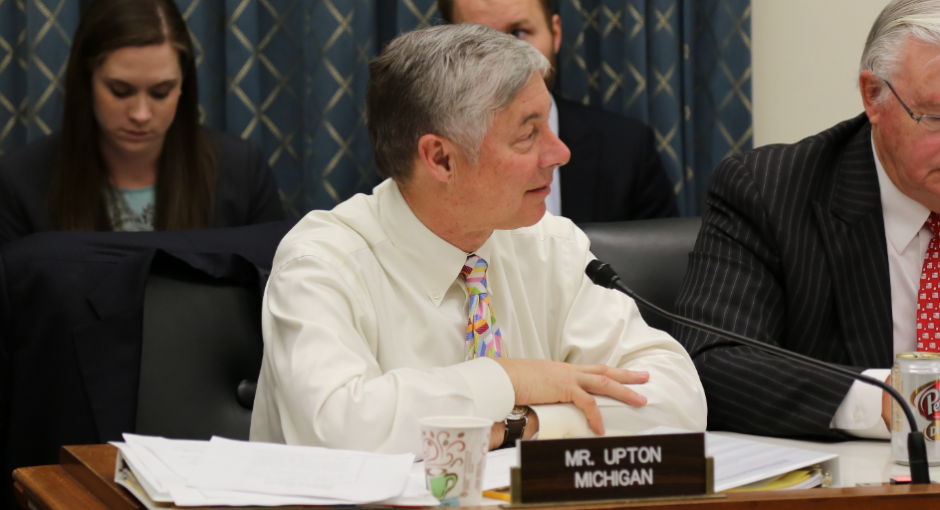U.S. Rep. Fred Upton (R-Mich.), a former House Energy & Commerce Committee chair who 340B entities call a close ally, announced on Tuesday he will not seek another term in Congress.
“Even the best of stories has a last chapter,” the 68-year-old Upton said April 5 on the House floor. “This is it for me.” Upton was one of only 10 Republican House members to vote to impeach Donald Trump after the January 6, 2021, U.S. Capitol insurrection. Former President Trump has been highly critical of Upton and had endorsed his challenger in the upcoming Republican primary.
A centrist in a party now dominated by conservative populists, Upton was first elected to Congress in 1986. He chaired the E&C Committee, which has primary jurisdiction over the 340B program in the House, from 2010 to 2016. Provider stakeholders say Upton held the line against changes sought by other Republicans that would have shrunken 340B participation and savings.
Instrumental Role Over 340B Program Oversight
In September 2011, Upton and GOP Sens. Orrin Hatch (Utah) and Charles Grassley (Iowa) asked the Health Resources and Services Administration pointed questions about its 340B program oversight. They wrote to HRSA on the same day that the Government Accountability Office issued a congressionally mandated study that found that HRSA relied too much on participant self-policing. HRSA’s own oversight, it said, was “inadequate to provide reasonable assurance that covered entities and drug manufacturers are in compliance with program requirements.”
Hatch was then ranking Republican on the Finance Committee and Grassley ranking Republican on Judiciary Committee. The three lawmakers asked HRSA what it was doing about program compliance audits, verifying participants’ eligibility, enforcing the prohibition on duplicate discounts, and dispute resolution. HRSA began auditing entities almost immediately after the inquiry and manufacturers a few years later. It also soon began requiring entities to recertify their eligibility annually. It took a decade, but HRSA ultimately published a rule setting up a 340B administrative dispute resolution process.
“Adequate monitoring by HRSA is fundamental to ensuring that the 340B program meets its goals of providing affordable outpatient drugs to patients of covered entities,” Upton, Hatch, and Grassley said in their letter to HRSA.
Challenging Job Addressing Competing Interests
In March 2015 while Upton was still E&C chair, its health subcommittee held the first hearing on 340B in a decade. The Senate by that time was under GOP control. Entities feared that the Republican Congress would pass 340B legislation favorable to the drug industry and unfavorable to healthcare providers. The hearing was widely seen as the start of the push for such legislation.
In his opening statement at the hearing, Upton brought up the 2011 GAO report and others by the U.S. Health and Human Services Department Inspector General that, he said, “have raised some concerning findings for sure about the mixed successes of current oversight of the program that need to be examined.” He also cited HRSA inability to issue omnibus 340B program regulations, “thus hampering its ability to effectively manage the program as we
would like to see it,” and concerns about “the rapid expansion of the use of contract pharmacies.”
Upton, however, balanced his concerns about 340B program oversight with anecdotes about seeing firsthand “the great work that this program does in my district.”
“Through the years, the program has allowed covered entities to stretch scarce resources to better serve millions of patients in Michigan and across the country who are uninsured, under-insured, or dependent on programs like Medicaid and Medicare,” he said.
“The 340B program has ensured that many of my underserved constituents have access to affordable, life-saving medicines that they otherwise would not be able to afford,” Upton said. “There is no doubt that the 340B program has played an important role in helping reduce costs while also extending access.”
“The 340B healthcare community could not have had a stronger supporter or friend in D.C. than Fred Upton,” said Bronson Healthcare Group senior vice president Chip Falahee. Bronson has five hospitals in or near Upton’s southwest Michigan district, three enrolled in 340B.
“Fred visited Bronson’s hospitals frequently. His last visit was in March. As usual, he thanked our staff for the excellent care they were providing to the patients,” Falahee said. “He would constantly reach out to the 340B hospitals in his district to learn how they were doing and if he could do anything more to help them.”
“I remember at least three times Fred and his staff visited my CHC,” said Tim Mallett, vice president of consulting firm 340Basics and former pharmacy director of Family Health Center Kalamazoo in Upton’s congressional district. “He was very interested in our concerns about the 340B program and met with hospital and CHC leaders to discuss our issues and needs.”
“While Chairman Upton was considered a friend to the 340B provider community, he was also well-liked by the pharmaceutical industry”, added Ted Slafsky, 340B Report Publisher and CEO. Slafsky, who worked closely with Upton during his long tenure as President and CEO of trade group 340B Health, pointed out that the Congressman was the lead co-sponsor of the 21st Century Cures Act, a bipartisan bill signed in 2016 to streamline the drug approval process and provide billions of dollars of funding for biomedical research. Pfizer’s largest manufacturing site is located in Kalamazoo on 1,300 acres.
“He was one of my favorite members of Congress,” a lobbyist on 340B issues said. “A straight shooter, funny, humble considering his rank, and with integrity. He was a good supporter of contract pharmacy. The community had some problems when he took a few attempts at legislative ‘discussion drafts’ when he was chair that would have increased reporting, authority, etc. This never went anywhere, and he always claimed he considered it only a starting point.”
Upton is widely respected on both sides of the political aisle, serving as vice chair of the bipartisan Problem Solvers Caucus. Due to his long tenure in the House, Upton is considered the dean of the Michigan congressional delegation.


